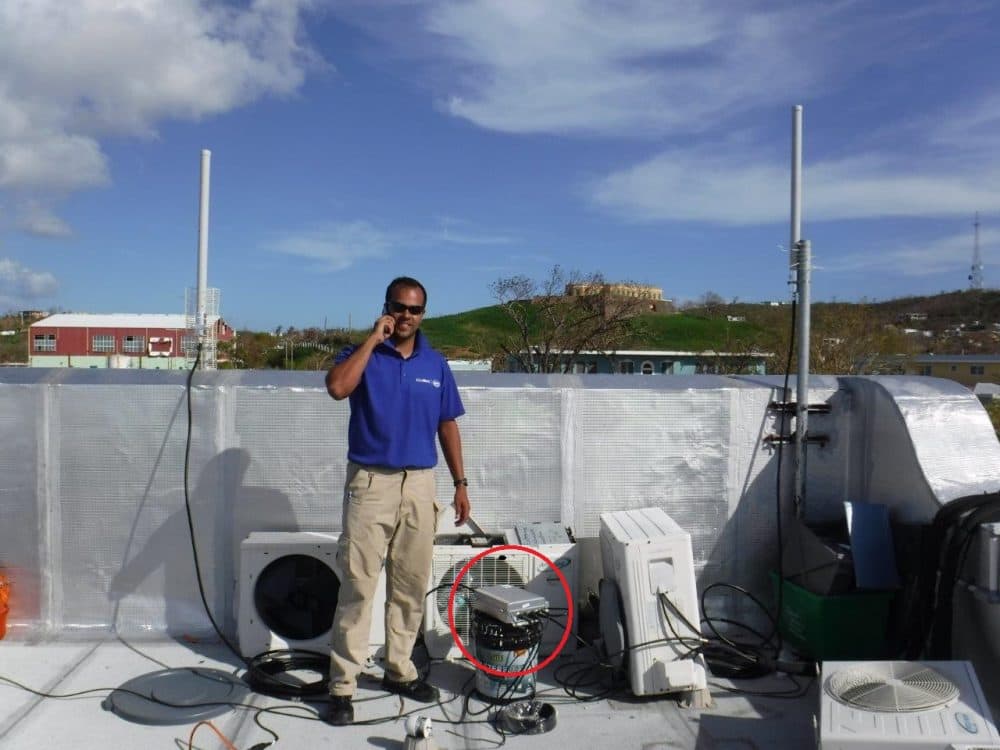Advertisement
Lexington Company Helps Restore Cell Service In Puerto Rico
Resume
As of Thursday, two weeks after Hurricane Maria struck Puerto Rico, only about 15 percent of the U.S. territory has cell service. That's kept people all over the island isolated and unable to even tell family elsewhere that they're OK.
But thousands of Puerto Ricans are able to contact people by cellphone, thanks to the work of a Lexington company.
Vanu Inc. makes cellular base stations, with the goal of helping the 1 billion people around the world who don't have cell service get connected. The portable stations are being used in rural Vermont and Rwanda.
Each station covers about a 3-mile radius and costs about $5,000. The company sent three stations to Puerto Rico and now plans to ship 40 more — all for free.
The equipment is connected on the ground to satellite dishes provided by another company to restore internet service on the island.
Founder and CEO Vanu Bose told us how the portable sites in Puerto Rico work.
Bose: It's a little box, 11 by 12 by 4 inches. You attach an antenna to it, which you try to put up as high as you can. And then there's an Ethernet port on it. You plug it into the satellite dish. That connects back to our switch in Long Island that's hosted by one of our partner companies, Globecomm Systems, and that's connected to all the different telecom operators. We can plug in, and all of a sudden 10 carriers can get service there.
So it's a great disaster relief solution, because it's not each carrier building out their own network — but we can support any or all of them.
Lisa Mullins: So through your company, you're providing the cell base station — the cell itself — and you're providing the service. How did you decide where this was going to go on the island?
That decision was made by the partner we got hooked up with on the ground, Global DIRT. They'd identified locations that need service, where they were putting the satellites, and they put our systems along with it. They've now gone and identified 34 more locations that need coverage. So we are busy prepping 40 more units to get down there so we can light up other areas of the island. So there's a lot of places to cover.
What was the first report you heard back on how this equipment was working — how it was being used?
Well, two reports. The first was from our Global DIRT partners, who said it was amazing. As soon as they plugged in the satellite — it was above a plaza on a town square — they said all of a sudden, everybody started pulling their phones out because all the text messages from their families and relatives started coming through. And as they said, you don't need to announce that you've lit up service. People just start getting texts.
But the most moving one was we got a tweet from someone in Puerto Rico who said... "This is how I was able to contact my family. Thank you." That makes it all worthwhile, right there.
And what beyond being able to call someone in the States, for instance, to say, 'I'm OK?' What other uses are you finding out about?
It's people arranging travel off the island. Now they have internet. They can figure out, "Where are resources? Where can I go to get services?" We are so dependent now on our mobile phones for information, that without it, you're really kind of lost.
This is a for-profit company. You're in a period of transition right now. Has it in any way changed your own thoughts about the company or plans for the company — this experience?
Well, yeah. You know, one of the things you hear about in disaster relief is how long it takes to bring communications up. And what I've realized is the technology and the service infrastructure we built for rural coverage is ideally suited to rapidly bring up emergency services. So we're focused on getting more systems down to Puerto Rico now.
But as soon as we can take a breath, I'm going to think about how can we make this part of our business so that we can rapidly deploy in an emergency — and not just around the U.S., anywhere in the globe. We're deployed in India, we're deployed in Africa. We should be able to support disasters there, as well. And I'm looking forward to get a minute to think about that.
This segment aired on October 5, 2017.

